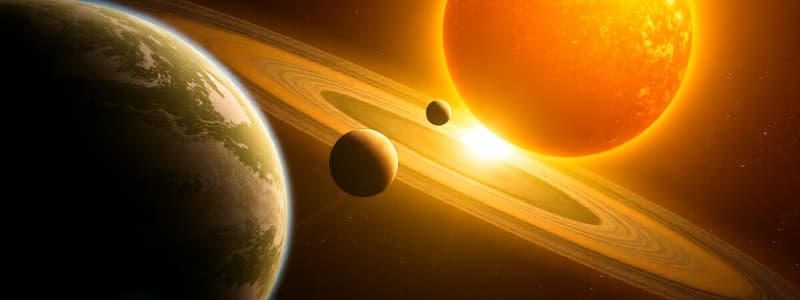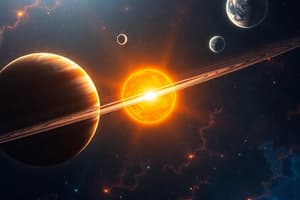Podcast
Questions and Answers
Which planet is known as the red planet?
Which planet is known as the red planet?
- Mercury
- Mars (correct)
- Jupiter
- Venus
Earth is the only planet capable of supporting human life.
Earth is the only planet capable of supporting human life.
True (A)
What is the main component of Jupiter's atmosphere?
What is the main component of Jupiter's atmosphere?
Hydrogen and helium
The planet closest to the Sun is __________.
The planet closest to the Sun is __________.
Match each planet with its distinguishing feature:
Match each planet with its distinguishing feature:
Which planet has a greenhouse effect due to carbon dioxide?
Which planet has a greenhouse effect due to carbon dioxide?
Saturn is denser than all other planets in the solar system.
Saturn is denser than all other planets in the solar system.
What are meteoroids primarily made of?
What are meteoroids primarily made of?
Flashcards
What is at the center of our solar system?
What is at the center of our solar system?
The Sun is the center of our solar system with eight planets orbiting around it.
What keeps planets in orbit around the Sun?
What keeps planets in orbit around the Sun?
The force of gravity from the Sun holds planets in their orbits.
Why are planets visible from Earth?
Why are planets visible from Earth?
Planets reflect light from the Sun, making them visible to us.
Which planet is closest to the Sun?
Which planet is closest to the Sun?
Signup and view all the flashcards
Which planet is the hottest?
Which planet is the hottest?
Signup and view all the flashcards
Why is Earth special for life?
Why is Earth special for life?
Signup and view all the flashcards
What are asteroids?
What are asteroids?
Signup and view all the flashcards
What are meteoroids?
What are meteoroids?
Signup and view all the flashcards
Study Notes
Solar System Overview
- The Sun is at the center of our solar system.
- Eight planets orbit the Sun.
- Planetary orbits are elliptical.
- Planets are illuminated by the Sun and reflect its light.
- Gravity holds planets in orbit around the Sun.
Mercury
- Closest planet to the Sun.
- Very hot.
- Shortest orbital period (shortest year).
- Covered in craters.
- No atmosphere.
Venus
- Hottest planet.
- Greenhouse effect due to carbon dioxide in atmosphere.
- Atmosphere traps heat.
Earth
- Supports life.
- Temperature range suitable for life.
- Liquid water on surface.
- Clouds of water vapor.
Mars
- Rocky, mountainous, reddish appearance (Red Planet).
- Thin atmosphere, primarily carbon dioxide.
Jupiter
- Largest planet in the solar system.
- Primarily composed of hydrogen and helium.
- Ring system made of rock and ice crystals.
Saturn
- Primarily composed of hydrogen and helium.
- Least dense planet.
- Ring system composed of rock and ice.
Uranus
- Ring system made of rock and ice.
- Atmosphere of hydrogen, helium, and methane.
Neptune
- Blue methane atmosphere.
- Large dark spots and fast-moving white clouds.
- Ring system.
Asteroids
- Rocky bodies orbiting between Mars and Jupiter.
Meteoroids
- Small pieces of asteroids or comets.
- Usually not visible in the sky.
Studying That Suits You
Use AI to generate personalized quizzes and flashcards to suit your learning preferences.




